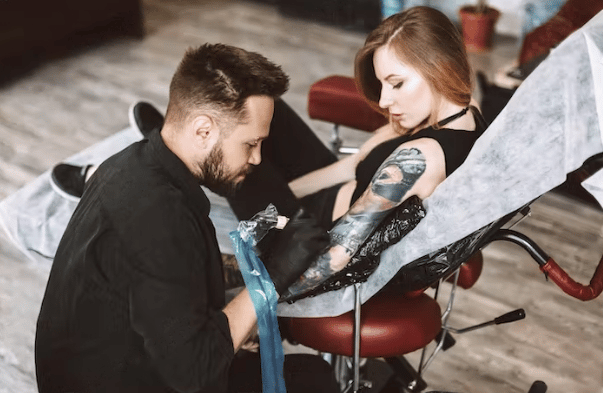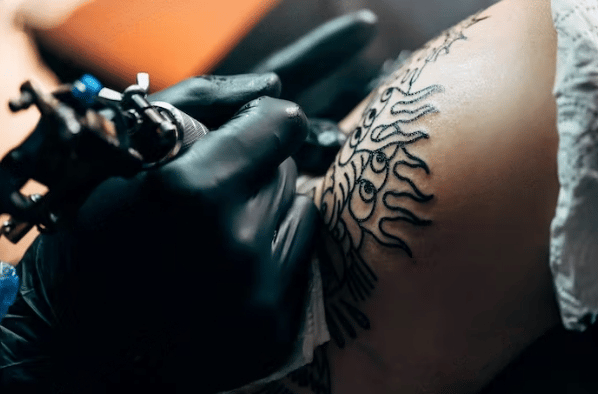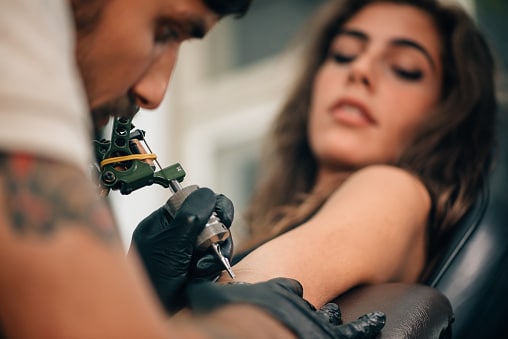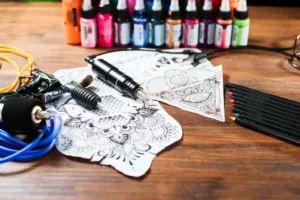A recent trend among millennials is getting tattoos. While there are a few reasons why a tattoo is popular, one of the most popular reasons is that it is trendy. Tattoos can be very individualistic and can show your personality in a way that other body art cannot.
Unfortunately, many people do not realise that tattoos are not just temporary decorations; ink takes about two weeks to heal. That means that if you decide to get a tattoo and are not prepared for the aftercare process, you may be in for some trouble.

Why Does Tattoo Aftercare Matter?
Tattoo artists and clients know the importance of aftercare. Tattoo aftercare is the process of cleaning, caring for, and protecting a tattoo. It’s important to stay on top of your tattoo’s needs. Here are some reasons why:
- Aftercare is important because it can help your tattoo heal faster and more effectively. Scarring can make it difficult for you to hide your tattoo.
- It can also prevent infections and other skin conditions from occurring. Infections can cause significant pain and discomfort.
- The benefits of aftercare can be understood by the fact that it is beneficial for both the artist and their client. The tattoo artist can enjoy a healthy tattoo with fewer risks, and clients can enjoy their beautiful tattoos for a long time without any complications.
Tattoo Aftercare Instructions
When it comes to tattoos, proper care is essential to keep the design looking vibrant and new for a long time. Here are some tips on how to take care of your new ink:
- Wash your tattoo regularly with soap and water. Avoid using harsh chemicals or abrasives, which can damage the skin. Clean your tattoo immediately after getting it done. This includes any activity that could cause contamination, like swimming or working out.
- Use mild soap and water, rinse thoroughly and pat dry. You can also use a mild soap-and-water mixture called After Tattoo Cleanser to take care of tough stains.
- Apply a thin layer of Moisturiser. Moisturising a tattoo as an aftercare keeps your tattoo looking great and helps reduce the chances of scarring.
- Cover the tattoo with a sterile adhesive bandage or wrap it if it’s uncomfortable to move around. This will protect it from debris and moisture while you wait for the scabs to form.
- Apply a topical cream or ointment once a day to help reduce redness and inflammation. These products also help seal in moisture and protect your skin from future damage. Avoid using creams with high levels of alcohol since they can dry out your skin.
- Avoid sun exposure and direct heat since this can also contribute to drying out your skin. To ensure your tattoo doesn’t fade prematurely, keep it moisturised with SPF50 sunscreen daily.
- Do not wear tight clothes around the area, as this can cause irritation. Instead, opt for loose-fitting clothing that will give you breathing space.
- If you experience any redness, pain or itchiness around the tattoo for 48 hours, see your doctor immediately! These could be signs of tattoo infection and require antibiotics or other treatment.
Use tattoo aftercare products to help soothe and protect the newly inked skin while providing nutrients to promote healing. Products that are effective at healing ink and preventing infection. Aftercare products should also be free of fragrances or oils that could further irritate the skin.

Conclusion
There are a few things to remember when it comes to tattoo aftercare. The first is that you should always keep the area clean and dry. This means showering as soon as possible, applying a topical ointment, and avoiding rubbing or picking the tattooed skin. In addition, it’s important to avoid direct sunlight and other sources of UV rays for at least six weeks after getting a tattoo. Finally, properly applying aftercare products can help ensure that your tattoo heals smoothly and looks its best.
Tattoo aftercare is not something you should take lightly because different types of infections can be present on your skin with tattoos. There are also other reasons why it is essential to see your doctor after getting a tattoo, like if the ink doesn’t settle well on your skin or if you notice any changes in the colouration or shape of the tattoo.
Was this article helpful? Let us know in the comments!
FAQs
Should I cover or expose my new tattoo?
There’s no right or wrong answer when it comes to covering or exposing a new tattoo. Some people might feel more comfortable keeping their tattoos hidden under clothing, while others may feel more comfortable displaying them proudly. It all depends on personal preference and what feels most comfortable for you.
When can I start showering with a new tattoo?
There’s no definitive answer to this question, as it depends on the size, placement and type of tattoo. Generally speaking, waiting at least two weeks after getting a new tattoo before taking a shower is advisable. This is because the ink may take too long to heal and fully fade. You may want to wait even longer if the tattoo is in a high-traffic area or close to your skin’s surface.
Why is my tattoo fading after three days?
Tattoos can last anywhere from a few days to a few years, but they are usually permanent. That being said, tattoos can fade over time if they are not properly cared for. Here are a few reasons why tattoos may fade after just a few days:
- The ink may start to wear off because of the daily rubbing and friction that occurs on the skin.
- If the tattoo is done with temporary ink, it will eventually disappear altogether due to sweat and oil production on the skin.
- Some people’s skin is naturally more porous than others, which means that the ink in your tattoo will start to seep out and fade faster.
- In extreme cases, even if you take good care of your tattoo, it may eventually be lost due to infection or scarring from previous procedures/injuries.




